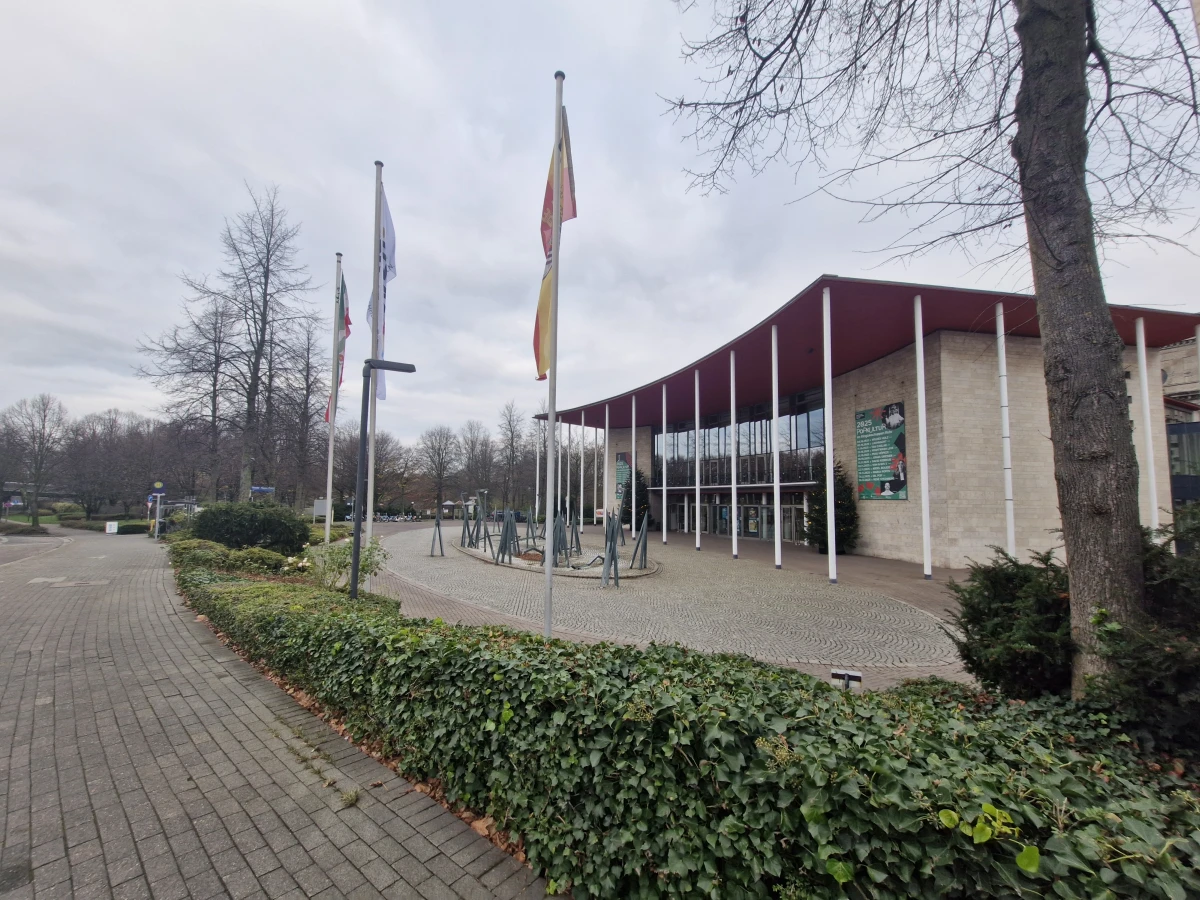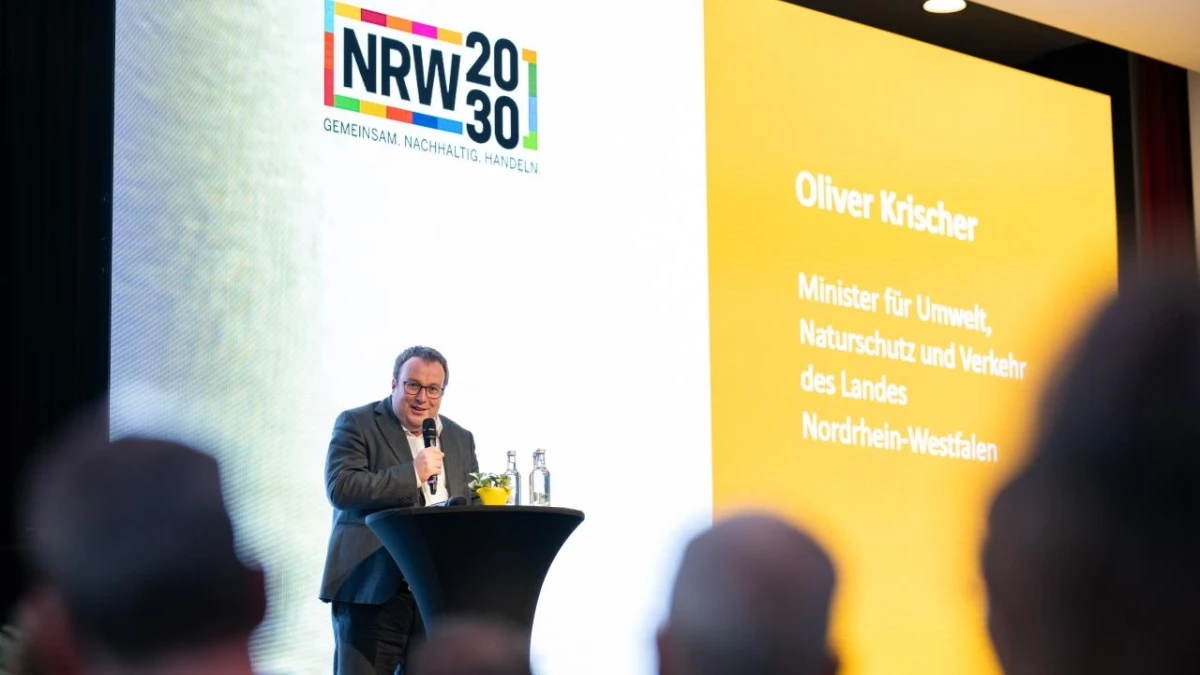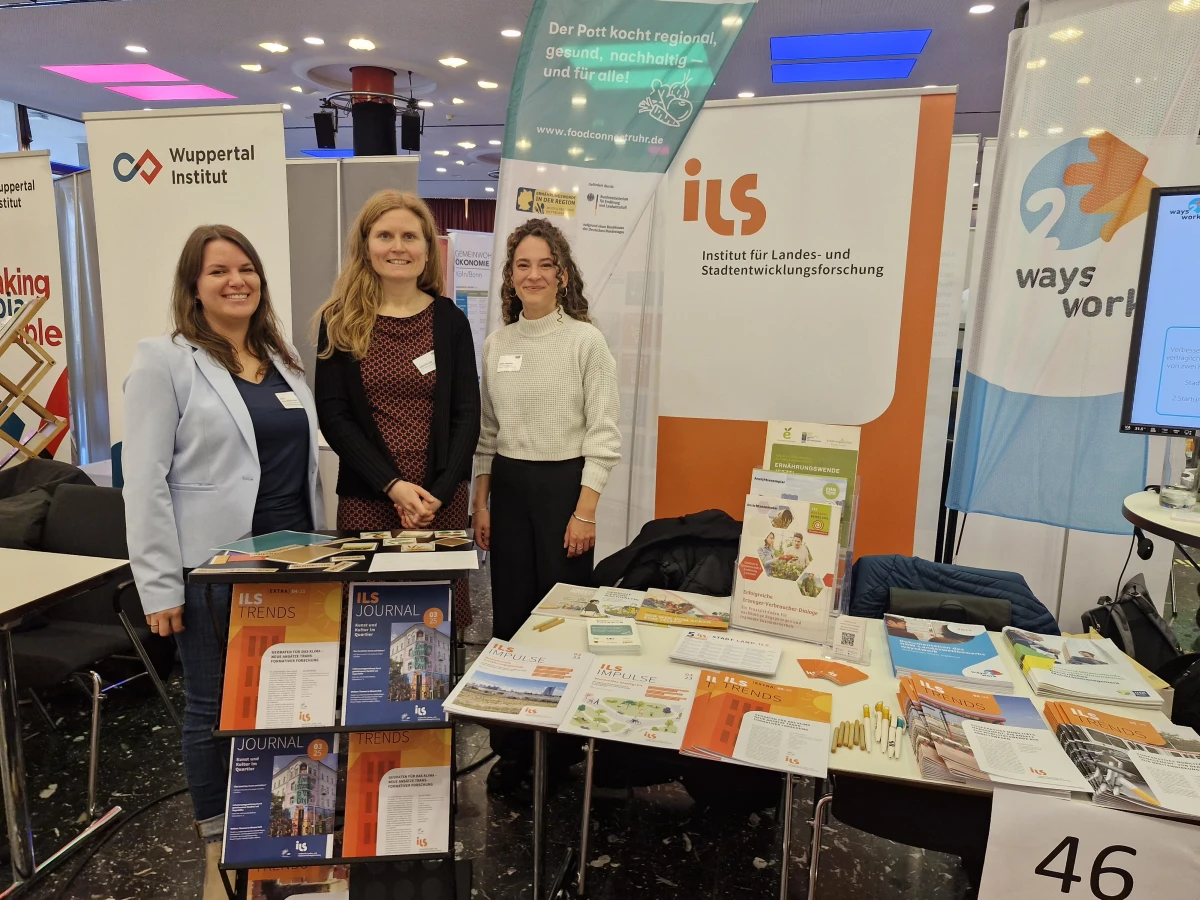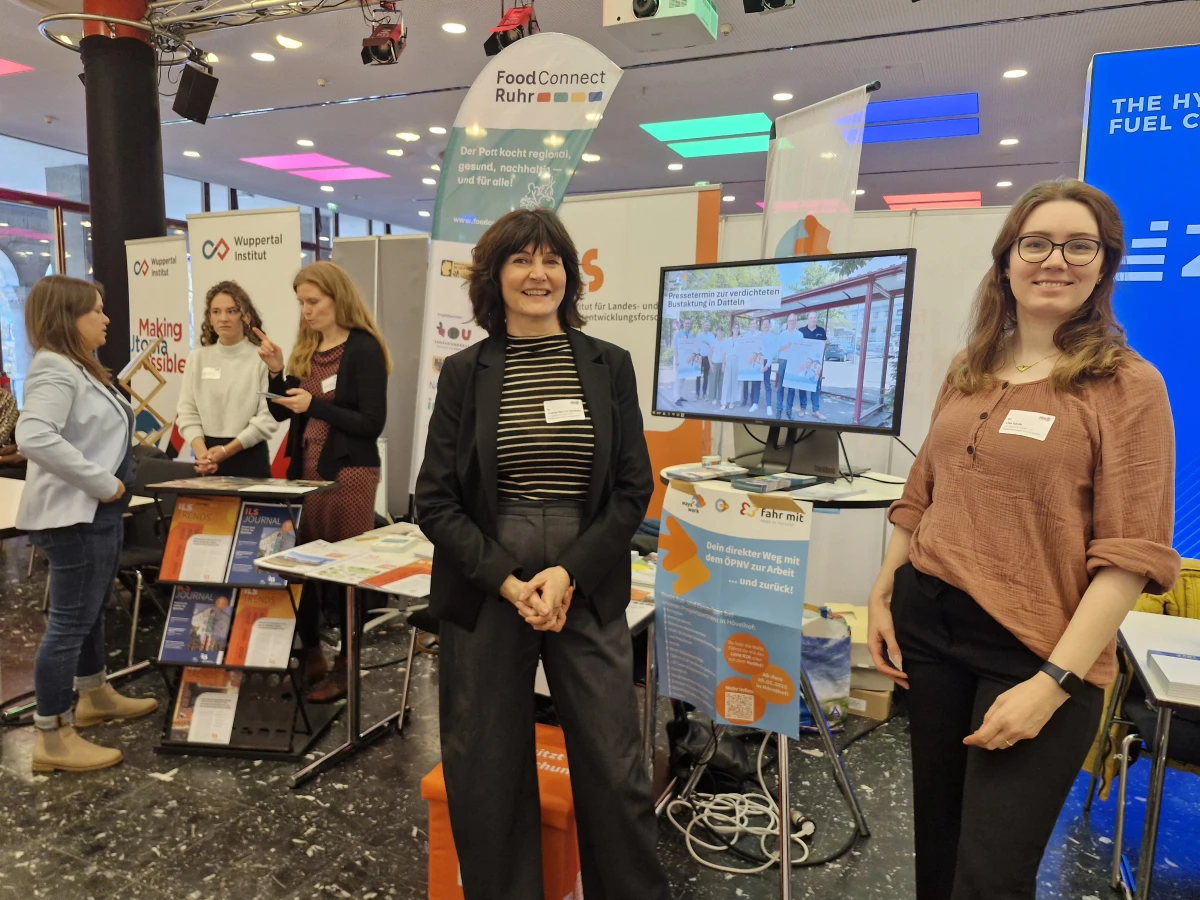Zeitz, Jana Friederike
Jana Friederike Zeitz, M.Sc. Geography
(area of specialisation: Urban and Regional Development Management)

Studied Geography with specialisation on Urban and Regional Development at the Department of Geography, Ruhr University Bochum.
Research interests:
- The right to the city
- Social and spatial inequality
- Urban and neighbourhood development planning
- Housing market and allocation strategies
Contact:
Phone: + 49 (0) 231 9051-244
E-Mail: jana.zeitz@ils-research.de
ILS-JOURNAL 03/25 erschienen
Was bewirken Kunst und Kultur? Das Titelthema des aktuellen ILS-JOURNAL 03/25 begibt sich auf die Suche in Europas Nachbarschaften. Das Projekt STARTUP wird vorgestellt, an dem das ILS beteiligt ist. Es untersucht die Wirkung von Kultur und Kreativwirtschaft auf einzelne Stadtteile, auf die Stadtregionen, und auch auf Europa als Ganzes. Annette Bathen berichtet im Interview von ihrer Praxiserfahrung als Vorstandsmitglied des Vereins Urbanisten e. V. in Dortmund. Dort begleitet sie seit Jahren Menschen dabei ihre Nachbarschaft eigenständig kreativ zu gestalten. Mehr…
ILS auf der NRW-Nachhaltigkeitstagung: Impulse für Mobilitäts- und Ernährungswende
Auf der NRW-Nachhaltigkeitstagung vernetzten sich am vergangenen Donnerstag rund 550 Engagierte aus Kommunen, Wirtschaft, Wissenschaft und Zivilgesellschaft, um gemeinsam Lösungen für die sozialen, ökologischen und ökonomischen Herausforderungen zu diskutieren. Die Konferenz in der Stadthalle Mülheim wurde von einem „Markt der Möglichkeiten“ begleitet, wo das ILS mit einem Stand dabei war. Mehr…
ILS auf der NRW-Nachhaltigkeitstagung: Impulse für Mobilitäts- und Ernährungswende
Auf der NRW-Nachhaltigkeitstagung vernetzten sich am vergangenen Donnerstag rund 550 Engagierte aus Kommunen, Wirtschaft, Wissenschaft und Zivilgesellschaft, um gemeinsam Lösungen für die sozialen, ökologischen und ökonomischen Herausforderungen zu diskutieren. Die Konferenz in der Stadthalle Mülheim wurde von einem „Markt der Möglichkeiten“ begleitet, wo das ILS mit einem Stand dabei war.
Schwerpunkt dort war die Vorstellung unserer Begleitforschung zum Landeswettbewerb „ways2work“ sowie Einblicke in das Projekt FoodConnectRuhr. Ways2work soll die Anbindung von Gewerbegebieten gezielt verbessern. Kommunen, Unternehmen und Beschäftigte erarbeiten dabei umfassende Mobilitätsmanagementkonzepte, damit die Mobilitätswende auch auf Arbeitswegen gelingen kann. FoodConnectRuhr bringt nach dem Prinzip „Vom Acker bis zum Teller“ Akteurinnen aus der Land- und Ernährungswirtschaft mit Lebensmittelverbraucher*innen zusammen, um Angebot und Nachfrage nachhaltiger Lebensmittel innerhalb der Modellregion zu verknüpfen.
NRW-Umweltminister Oliver Krischer stellte auf der Nachhaltigkeitstagung die neue Nachhaltigkeitsstrategie.NRW 2026 vor. Die Strategie bildet den Rahmen, mit dem NRW einen wirksamen Beitrag zu den 17 globalen Nachhaltigkeitszielen der Vereinten Nationen leisten will, die bis 2030 erreicht werden sollen. Der Entwurf unter Federführung des Umweltministeriums wurde so bereits vom Landeskabinett für die Beteiligung der Öffentlichkeit freigegeben. Die öffentliche Beteiligung läuft bis zum 31. Januar 2026.

550 Teilnehmende diskutierten in Mülheim.

NRW-Umweltminister Krischer stellt die Nachhaltigkeitsstrategie.NRW 2026 © MUNV NRW/ Mark Hermenau

Am Stand wurde das Projekt FoodConnectRuhr vorgestellt © von Bischopink/ILS

Die Besucher*innen erhielten außerdem Einblicke in die Modellvorhaben von ways2work © von Bischopink/ILS
ILS zu Gast beim Zukunftsforum ländliche Entwicklung
Auf Einladung des Bundesministeriums für Landwirtschaft, Ernährung und Heimat wird das ILS am 21. und 22. Januar 2026 beim Zukunftsforum ländliche Entwicklung zu Gast sein. Gemeinsam mit 5 anderen Institutionen wird das ILS ein Fachforum zum Thema „Flächen im Wandel: Konflikte, Experimente und Werkzeuge nachhaltiger Landnutzung“ organisieren. Das Fachforum lädt dazu ein, über neue Wege im Umgang mit begrenzten Flächen und unterschiedlichen Interessen nachzudenken. Mehr…
ILS zu Gast beim Zukunftsforum ländliche Entwicklung
21.01. und 22.01.2026 in Berlin und im Livestream
Auf Einladung des Bundesministeriums für Landwirtschaft, Ernährung und Heimat wird das ILS am 21. und 22. Januar beim Zukunftsforum ländliche Entwicklung zu Gast sein. Gemeinsam mit 5 anderen Institutionen wird das ILS ein Fachforum zum Thema „Flächen im Wandel: Konflikte, Experimente und Werkzeuge nachhaltiger Landnutzung“ organisieren. Das Fachforum lädt dazu ein, über neue Wege im Umgang mit begrenzten Flächen und unterschiedlichen Interessen nachzudenken. Drei Impulse geben Einblicke in zentrale Themenfelder:
- „Potenziellen Konflikten beim Ausbau Erneuerbarer Energien begegnen“ (Melanie Mbah (Öko-Institut) und Meike Fienitz, (Leibniz-Zentrum für Agrarlandschaftsforschung (ZALF) e.V.)
- „Reallabore für Landwirtschaft, Ernährung und ländliche Räume“ (Prof. Dr. Thomas Weith (ILS) und Ramona Bruck (Leibniz-Institut für Gemüse- und Zierpflanzenbau (IGZ) e.V.))
- „Werkzeuge für nachhaltiges Flächenmanagement: Konflikte erkennen, vermeiden, lösen“ (Antonia Schumann (neuland21 e.V.))
Anschließend erproben die Teilnehmenden im World-Café-Format konkrete Ansätze: Wie lassen sich Konflikte frühzeitig sichtbar machen und Beteiligung gestalten? Welche Chancen bieten Reallabore für Landwirtschaft, Ernährung und Energiewende? Welche Methoden unterstützen in schwierigen Situationen? Ziel ist es, gemeinsam praxisnahe Lösungsansätze und Handlungsempfehlungen zu entwickeln – mit Fokus auf Kooperation, Experimentierfreude und methodischer Vielfalt. Das Fachforum organisiert das ILS gemeinsam mit dem Öko-Institut Freiburg e.V., dem Leibniz-Zentrum für Agrarlandschaftsforschung (ZALF) e.V., der Koordinierungsstelle Agrarsysteme der Zukunft, dem Leibniz-Institut für Gemüse- und Zierpflanzenbau (IGZ) e.V., neuland21 e.V. und der Wüstenrotstiftung.
In den vergangenen Jahren trafen sich zum Zukunftsforum in Berlin und virtuell jeweils über 1200 Akteure aus Politik, Verwaltung, Institutionen, Verbänden, Wissenschaft und Zivilgesellschaft zum Austausch über die Ländliche Entwicklung.
Weitere Informationen und die Anmeldemöglichkeit finden Sie hier: https://www.zukunftsforum-laendliche-entwicklung.de/





